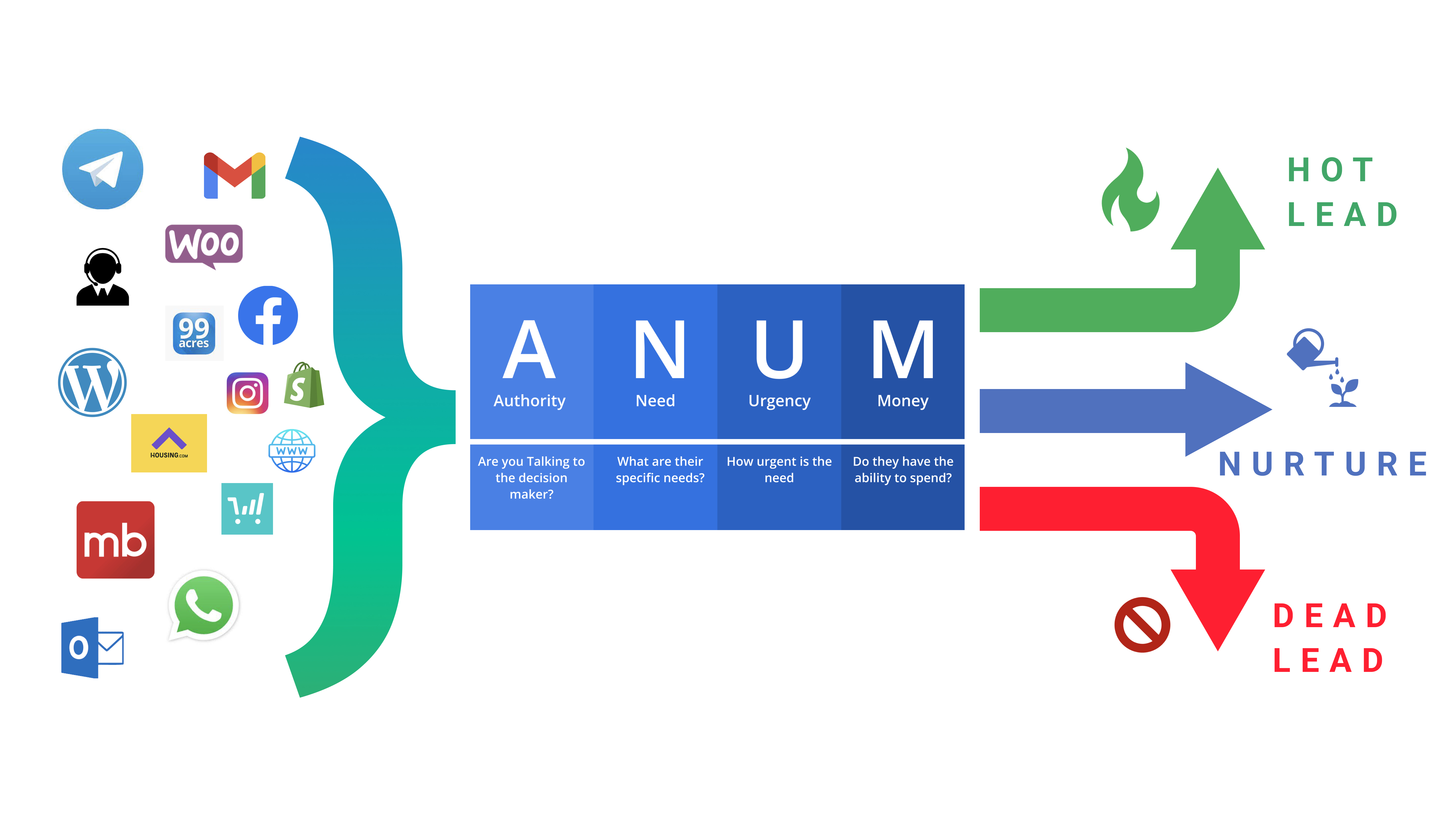ANUM: A Comprehensive Lead Qualification Framework


The most tiring job in the sales process is lead qualification. If done properly, it enables businesses to prioritize their sales team's efforts and allocate resources effectively. Among many other popular lead qualification methodologies, one framework is ANUM. It is the acronym for Authority, Need, Urgency, and Money. This article will explore the origins, framework, advantages, disadvantages, and application of ANUM as a lead qualification framework.
1) Origin and History:
Developed by Ken Krogue, ANUM is a qualification framework based on the principles of BANT. It gained popularity due to its effectiveness in managing complex sales cycles and multiple decision-makers.ANUM is well-suited for industries that involve high-value transactions, long sales cycles, and B2B sales models.
As ANUM focuses mainly on "Authority" and is entirely customer-centric, many industries continue to utilize it as part of their lead generation, qualification, sales conversion, pipeline management, and account-based marketing to maximize conversion rates and drive revenue growth.
2) Framework:
Let's understand these The ANUM framework comprises four key elements:
a) Authority:
This criterion focuses on determining the decision-making power and influence of the lead within the organization.For example, determining if the lead is a C-level executive or a department head with purchasing power. Understanding the lead's level of authority or asking questions like "Who else is involved in the decision-making process?" or "Are there any other stakeholders or individuals who play a role in the decision-making process?" helps in finding the person in authority.
b) Need:
Assessing the lead's pain points, challenges, and requirements is crucial for aligning the offered solution with their specific needs. Understanding the lead's needs allows sales teams to position their offerings as tailored solutions that address their unique challenges.
c) Urgency:
Evaluating the lead's sense of urgency and the timeframe for purchasing is essential. Understanding lead's motive behind purchase and time sensitivity enables sales teams to prioritize their efforts and focus on leads actively looking for a solution.
d) Money:
Assessing the lead's financial capability and budget for purchasing is a critical aspect of lead qualification. Lead's budget clarity allows sales teams to tailor their offerings accordingly and refrain from investing resources in leads that may not have the financial means to convert.
3) Advantages:
ANUM offers several advantages as a lead qualification framework:
a) Holistic Evaluation:
ANUM provides a comprehensive framework that considers both qualitative and quantitative aspects of lead qualification. It ensures that sales teams consider multiple factors, including authority, need, urgency, and financial capacity, to understand the lead's potential holistically.
b) Tailored Approach:
By evaluating the lead's authority, need, urgency, and money, sales teams can tailor their approach and messaging to match the lead's specific requirements. This increases the chances of resonating with the lead and positioning the offering as a valuable solution.
c) Alignment with Complex Sales Cycles:
ANUM suits industries with complex sales cycles involving multiple decision-makers. By assessing authority and need, sales teams can identify the key stakeholders and tailor their approach to address their unique concerns and requirements.
4) Disadvantages:
While ANUM is a valuable lead qualification framework, it does have some limitations:
a) Limited Stakeholder Perspective:
While ANUM focuses on authority, it may overlook the influence of other stakeholders involved in the purchasing decision. Considering the broader network of decision-makers and influencers is essential for a comprehensive evaluation.
b) Potential Oversimplification:
The framework's reliance on four critical criteria may need to be more balanced with the complex nature of lead qualification. Each lead and sales situation is unique, and ANUM's rigid structure may not account for all the nuances and complexities that may arise.
5) Summary:
ANUM, with its emphasis on authority, need, urgency, and money, offers a comprehensive and practical framework for lead qualification. It enables sales teams to evaluate leads holistically, tailor their approach, and align their efforts with the lead's specific requirements. However, it is important to consider the limitations of ANUM and adapt the framework to suit the unique characteristics of each sales situation.
Action Points:
- Implementing an ANUM Lead scoring Framework on Pronnel: Know More About How You Can Implement a Lead Scoring Mechanism on your Lead Management Board in Pronnel.
- Read more about how you can guide an exploratory Sales discussion to Qualify Leads Based on the ANUM Framework. What questions can you ask? How?
- Learn about other Lead Qualification frameworks like BANT, CHAMP, FAINT, MEDDIC, GPCTBA/C&I
Subscribe To Our Blogs
Get the latest blog notification into your email.